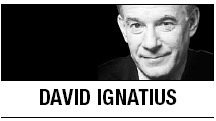WASHINGTON ― After months of war fever over Ukraine, perhaps the biggest surprise is that citizens there will be voting to choose a new government in elections that observers predict will be free and fair in most areas.
This electoral pathway for Ukraine seemed unlikely a few weeks ago, given Russian President Vladimir Putin’s annexation of Crimea and his covert campaign to destabilize the Russian-speaking areas of eastern Ukraine. There were dire warnings of a new Cold War, and even of a ground war in Ukraine. The country seemed at risk of being torn apart.
 Putin appears, at this writing, to have decided that Russia’s interests are better served by waiting ― for the nonaligned government he expects will emerge from Sunday’s elections ― than from an invasion or some radical destabilization. The Russian leader may be ready to accept a neutral country, between East and West, where Russia’s historical interests are recognized. During the Cold War, such an outcome was known as “Finlandization.”
Putin appears, at this writing, to have decided that Russia’s interests are better served by waiting ― for the nonaligned government he expects will emerge from Sunday’s elections ― than from an invasion or some radical destabilization. The Russian leader may be ready to accept a neutral country, between East and West, where Russia’s historical interests are recognized. During the Cold War, such an outcome was known as “Finlandization.”
If this Finland-like status is what Ukrainians support (and recent evidence suggests their new leaders may indeed choose this course) then it should be a welcome outcome for the West, too. Ukraine’s problems are internal; it needs ideological coherence more than territorial defense. It needs the breathing space that nonalignment can provide. The Ukrainian people can’t be barred from seeking membership in NATO or the European Union, but it’s unimaginable that either body would say yes, perhaps for decades. So Putin can breathe easier on that score.
Maybe the elections will dull the self-flagellating domestic rhetoric in America that Putin’s menacing moves were somehow the fault of President Obama and his allegedly weak foreign policy. Obama has made mistakes, especially in the Middle East, but his Ukraine policy mostly has been steady and correct. He recognized that the U.S. had no military options and fashioned a strategy that, with German help, seems to have deterred Putin from further recklessness.
If the election goes forward (with Putin maintaining his current “wait and see” stance), Obama deserves credit for crisis policymaking of the sort recommended by the respected British strategist Lawrence Freedman. “The basic challenge of crisis management is to protect core interests while avoiding major war.” Freedman wrote in a March essay on the blog “War on the Rocks.” He argued, even then, that criticism of Obama’s allegedly weak stance was “overdone.”
The case for “Finlandization” emerges in a monograph prepared recently by the State Department’s Office of the Historian. It argues that “Finnish foreign policy during the Cold War successfully preserved Finland’s territorial and economic sovereignty, through adherence to a careful policy of neutrality in foreign affairs.” Ukraine’s new government may pursue a similar nonalignment, judging from the leading candidate, billionaire oligarch Petro Poroshenko, who has pro-Western ties but also served in the Moscow-leaning government of deposed president Viktor Yanukovych.
The State Department study also noted that nonalignment allowed Finland “to serve as a bridge between the Soviet bloc and the West.” Helsinki became a meeting ground for arms-control and human-rights talks that eventually transformed Eastern Europe. A similar bridging role for Ukraine would be welcome, as it would draw Russia west, away from an atavistic strategy of creating a Eurasian trade bloc to re-establish Soviet-style economic hegemony.
For all the war talk, Ukraine has really been a test of nonconventional forces and covert action rather than military intervention. Putin, the ex-KGB officer, launched a deniable “stealth” invasion of Crimea in February, using troops without insignia. He continued the pressure in eastern Ukraine by working with pro-Russian irregular militias, though their unruly behavior eventually seemed to worry even Putin. He may have threatened invasion but he never seemed eager to roll his tanks across an international border.
What seems to have slowed Putin’s allies in Ukraine is similarly unconventional. It wasn’t Ukrainian government troops that restored order in eastern cities such as Donetsk and Mariupol. The army’s performance was middling, at best. Stability returned because of the deployment in at least five eastern cities of steelworkers and miners apparently dispatched by Ukraine’s richest man, Rinat Akhmetov, who opposed a breakup of his country.
“This has to be Ukraine’s choice,” argues Karen Donfried, the new president of the German Marshall Fund (where I’m a trustee) and former National Security Council director for Europe. If Ukrainians seek an accommodation with Moscow, it must be their desire for self-limitation, not a policy imposed by Washington or Berlin.
The stabilizing factor here will be a Ukraine that makes its own decisions.
By David Ignatius
David Ignatius’ email address is davidignatius@washpost.com. ― Ed.
(Washington Post Writers Group)

